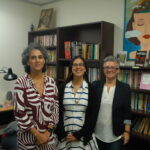

“This is going to give us the opportunity to have a richer, wider audience and to be in the same place that other major writers are participating in,” said Gabriela Baeza Ventura, associate professor of Hispanic Studies and executive editor at Arte Público Press. | Traynor Swanson/The Cougar
The first novel of immigration, published in 1916 in Spanish, and the first novel published by a Mexican woman, from 1872, lay on the shelves of University of Houston-based Arte Público Press. Around them, hundreds of other literary legacies of Latinos in the U.S. need to be digitized. For an efficient method of digitization, modern technological tools are needed and slow methods won’t be an option any more.
In an attempt to preserve that literary history, UH was awarded a grant from the Council on Library and Information Resources and the nonprofit Andrew W. Mellon Foundation to establish the country’s first center in digital humanities that will focus on U.S. Latino Studies.
“This is going to give us the opportunity to have a richer, wider audience and to be in the same place that other major writers are participating in,” said Gabriela Baeza Ventura, associate professor of Hispanic Studies and executive editor at Arte Público Press.
She and Brown Foundation Director of Research of the Recovery Project Carolina Villarroel received the two-year fellowship grant of $167,700 in early August.
Baeza Ventura and Villarroel plan to start using different technical platforms that facilitate research, such as Voyant — a web tool that facilitates text analysis and interpretive practices for digital humanities scholars — and Omeka — a server that allows people to create digital exhibitions.
“As a student, when you look at (such programs) you can start thinking (and) looking at literature in a very different way,” Baeza Ventura said. “You start seeing that literature is not necessarily just tied to the book itself, but it also allows you to see beyond the book, like how it was produced, the way maybe a writer is using a term that as a reader you may not see when you are reading it. The computer extrapolates that information for you, and you start seeing it in a different perspective.”
Baeza Ventura added that the M.D. Anderson Library has an Omeka server, so the goal is to work with some of the extant setups to create projects.
The center will increase the opportunities and learning process for students early in their careers, she said, because they will be able to do research and learn how to work different software.
According to their web site, the Council on Library and Information Resources gives two-year fellowships in data curation for Latin American and Caribbean Studies that provide Ph.D. graduates with a professional development, education and training opportunities. In exchange, postdoctoral students share and help their host institutions with practices and services in data curation.
“My goal is to help and bring the Recovery Project to the next level and help the scholars who are interested in these archives,” said Lorena Gauthereau, the postdoctoral fellow funded through the grant.
The creation of this center will allow masters and doctoral students who do not want to go into the teaching field to continue their education, Baeza Ventura said.
“It is the first time that they have given this grant to this specific group of Latin American and Caribbean (Studies), and specifically it is different for us because we specialize in Latinos and Latinas in the U.S.,” Villarroel said. “Actually, this is the first time they actually gave it to a Latino-focused group institution in the United States.”
The Recovering the U.S. Hispanic Literary Heritage Project, also known as the Recovery Project,is a center for research that is home to written material about Latino documentary history in the U.S. from colonial times to 1960. It’s part of Arte Publico Press, a Spanish-language publisher based at UH.
“There is material in the archives that has not been studied,” Baeza Ventura said. “We just have not been able to have enough researchers to do publications on these projects, so now if we work towards the creation of a digital humanities center that will be focused on U.S. Latinos, what we will do is we are going to start populating the web — the virtual world — with all this information on Latinos that was not available before.”
For 25 years, board members from the Recovery Project have worked in digital humanities compiling research and digitizing materials– making that information available through databases– since before this was known as digital humanities, Villarroel said.
“This is firsthand access to one-of-a-kind archives that no other place in the United States has,” Baeza Ventura said.
Baeza Ventura added the creation of this center is still in its initial stages, but she and Villarroel hope the research center will be available to students, scholars and the UH community in less than five years.
“We want to show that Latinos have been writing and participating, they are cultural icons, they are Americans and they have been contributing to the culture and the legacy of writing the American history of the United States since forever, since before the United States was a country,” Baeza Ventura said.
news@thedailycougar.com
—
“Grant will found first-of-its-kind Latino studies digital resources center” was originally posted on The Daily Cougar
